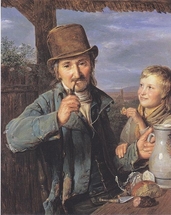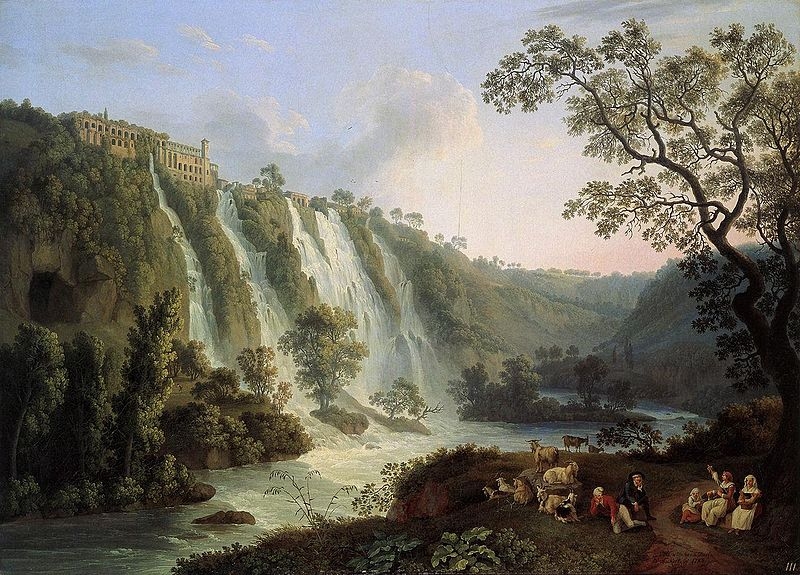003.
The Forsaken Merman by Matthew Arnold: A Creation of Beauty. Appreciation By P.S.Remesh Chandran.
Editor, Sahyadri Books & Bloom Books, Trivandrum.
By PSRemeshChandra, 13th Mar 2011.
Short URL http://nut.bz/1ljtosiw/
Matthew Arnold has been a severe critic of Literature. Essays In Criticism was his monumental work in which he let no great poet go unscathed. Usually such critics would be asked a common question: why don't you write a great poem? This poem The Forsaken Merman was Arnold's answer in which he proved not only could he create poems of hilarious themes but could incorporate a number of exquisite tunes also in a single poem. After creating a few more poems he returned to Criticism and Academics.
The Forsaken Merman. Poem by Matthew Arnold. An appreciation.
 |
| Ocean is nothing but land submerged. By Asea. |
Matthew Arnold relates a very strange story in his poem The Forsaken Merman. The beautiful poem is picture-like, the descriptions of the sea-scapes and land-scapes vivid and presentation of the theme is logical. But the story is impossible to happen, though his inspiration for the theme can perhaps be traced to a spectacular sea-side village named Zennor in the County of Cornwall in England. It is not clear whether he happened to visit this village, but there indeed is a Mermaid Chair in the Church and also an associated legend, the hero in which having the poet's exact name Matthew. A mermaid who lived in the Pendour Cove was entranced by Matthew's exotic singing in the church and regularly visited the church in disguise. One day Matthew found out, fell deeply in love and followed her beneath the waves to her deep sea cavern. They were never again seen on land. The Cornish legend holds that in silent nights Matthew can still be heard singing from the deep sea, faintly brought to land by the breeze.
A lady from the land making her home in the deep sea cavern.
 |
| Lady from the land makes home in sea cavern. Place called Mermaid's Boobies in sea. Chris Gunns. |
Margaret, a lady from the land happened to marry a King of the Sea, a merman. She now has her home and her children in the deep sea where they live in a cavern. The winds are all asleep there. The cavern is sand-strewn, cool and deep. The cavern is cold and dark also. Sea plants, sea animals and sea snakes are all around. Sometimes great whales can be seen passing by, resembling great ships on the sea surface. She has a loving husband and is leading a happy life in the depth of the sea.
Life arriving alighted on meteorites from cosmic realms.
Where the Winds are all asleep.
Days of festivities in the land are endeared and nostalgic to all terrestrial human beings who are far away from land. One day, on silent Christmas nights, the sounds of pealing church bells reach the ocean bottom from the land. Man is mortal, temperamental and selfish. But water is something rare, precious and ethereal. Ocean is where life originated, smithereens of which arrived alighted on meteorites from the cosmic realms and deposited there Aeons ago. Considering the length and brevity of history of life in the sea and in the land, there is difference in the subtlety in loyalties. The sea demands much in loyalty but the loyalty of a land-locked being is brittle.
Church bells from the land reaches where the winds are all asleep.
 |
| Church on the Hillside. Jonathan Billinger. |
Hearing the tongs of bells from the far away land, Margaret became home-sick and wishes to rise to the land to participate in the Christmas celebrations there. She forgets she is a mother and wife. It is terrible and strange that she is tired of sea-life overnight. She says:
"It will be Easter time in the world- ah me!
And I loose my poor soul Merman, here with thee."
So with her loving husband's permission, she rises from the sea and reaches her home land. The land has its thrills, beauties and enjoyments just as the sea has its own. Margaret forgot her family left behind in the deep sea.
From the deep sea in search of a beloved wife.
Mermen and the angels are thought to be alike in many respects. Ardence, affection, kindness and mercy are considered to be their characteristics. Mighty monarchs of the deep, perfectly reflecting the magnanimity and loftiness of the oceans, keep their vows of chastity and integrity. The King of the Sea waited long for his wife's return from the land. So one day, with their children, he too rose up from the sea, came to land and visited the church where Margaret usually prayed.
Generations of grief in the tumultuous soul of the holy trinity.
Steps to the Curch where Aliens walked.
They stood secretly outside and peeped inside through the church window. Being not humans and therefore aliens in land, they dared not go inside. This grief-stricken trio consisting of father, daughter and son knew nothing about Christian kindness. They were a holy trinity unto themselves. Generations of grief had been what caused that cosmic particle deposited on the ocean to germinate and evolve itself into life forms. Wind and waves and sky can never quieten the tumult in their souls. Won't humans ever pay their debts to their gods?
A mother of ingratitude, her eyes sealed to the holy book.
 |
| Her Eyes were Sealed to the Holy Book. Matthias Feige. |
Her face was buried deep in the Bible. Through mutually understandable gestures, he tried in many ways to hint that their children very much longed for her. He asked the children to call and appeal to the motherhood in her in their voices in the hope that children's voices would be dear to a mother's ear. The children called their mother in their voices familiar to her. It was all in vain. She listened not. ‘She gave them never a look, for her eyes were sealed to the holy book.' It is the first time the readers of this poem curses and hates the holy book. She was pretending. So it was useless persuading her to go back with them to the sea. She was determined not to return to sea.
We will gaze from the sand hills, at the white sleeping town.
 |
| We will gaze from the sand hills. Steve Cadman London UK. |
Before returning to the sea with his children, the Merman once again visited the church and the town where his wife lived. He could see that she was living a very happy and contended life. She was seen always singing of supreme joy. 'She sang her fill, singing most joyfully.' However, the merman could see a tear drop down her sorrow-clouded eye. She was actually sad for her children left at sea. The cold, strange eyes of her little girl child looking at her through the equally cold church window had created pangs in her guilty soul. So the disappointed merman with his children decided to return to the sea. Before he goes, he proposes to his children to visit the land on moonlit nights again. They would come and see the church and the town by nights. He sings:
"We will gaze from the sand-hills
At the white sleeping town,
At the church on the hill side
And then come back down."
The pain in the eyes of a girl-child left out by her mother.
 |
| We will gaze at the lost town. Mermaid statue Cleveland Museum of Art Ohio. Daderot. |
Matthew Arnold created the closing lines of this poem ever memorable. The grief of a girl-child who is left out and abandoned by her beloved mother can never be and shall be described in words. It is unspeakable. The readers will never forget the pain in the cold strange eyes of the girl child looking at her mother through the church windows. Arnold wished to make the world weep with his poem; he succeeded.
Note
Matthew Arnold was the son of Thomas Arnold, the famous teacher who introduced the famous Public School System in England. The son did not fail his father even once and not only shone like a star in literature, but excelled as an Academic and Inspector of Schools also. Even though he was a critic in blood, we will forget he is, once we get immersed in his poetry. He is indeed a born poet also. What he really was, a critic or a poet, perhaps he himself might not have known well. However, his over-indulgence in literary criticism was responsible for the scantiness of his poems. His creations in both fields are equally excellent and respected.
It is known that no one has ever orchestrated The Forsaken Merman fully which is a great loss to the world. He used a variety of excellent tunes in the song to appropriately and touchingly express each move and twist in the mood along the song, which it seems he conceived as a musical entertainment. I approached this song not as an academic but as an appreciator struggling to sing it. I was thrilled at my success. I did nothing special or exceptional in my endeavor, but repeatedly sang it as many times till the original music that was on the mind of the poet while writing this song automatically clicked and was revealed. It was like unlocking a closed precious thing through perseverance. It should be said that this cunning poet skillfully locked his music to prevent access to the lazy and the haughty.
The musical experiment Matthew Arnold did with The Forsaken Merman is unique in the field of music as well as in the field of literature. Only one other poet has ever been known to have conducted such a bold, successful and thrilling experiment in music as well as in literature. It was Alfred Lord Tennyson. The poem was The Lotos-Eaters. In this song Tennyson invented and used a number of tunes to move in synchronization with the tantalizingly changing actions of the intoxicated. He incorporated even the swaying to and fro movements of the ship carrying the Lotos-eaten dreamers in corresponding movements in his music. The world is still awaiting the Choreographed Orchestrations of The Forsaken Merman and The Lotos-Eaters. They are yet to come, but they will come indeed.
_____________________________
Pictures Courtesy: Wikimedia Commons
_____________________________
Tags
Appreciation, English Literature, English Poems, Forsaken Merman, Matthew Arnold, Psremesh Chandran, Reviews, Sahyadri Books Bloom Books, Trivandrum
Meet the author
PSRemeshChandra
Editor of Sahyadri Books & Bloom Books, Trivandrum. Author of several books in English and in Malayalam. And also author of Swan: The Intelligent Picture Book.
Share this page
Delicious Digg Newsvine Reddit StumbleUpon Twitter










